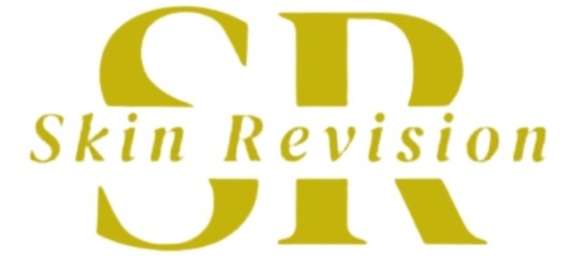What is Acne?
Acne occurs when hair follicles become clogged with oil (sebum) and dead skin cells. This blockage can result in the formation of whiteheads, blackheads, pimples, or even deeper cysts. Acne primarily appears on the face, chest, back, and shoulders, where sebaceous glands are more active.
While acne is often linked to hormonal changes during puberty, it can develop at any age. Factors such as genetics, diet, stress, and lifestyle also play a significant role in the severity of acne.
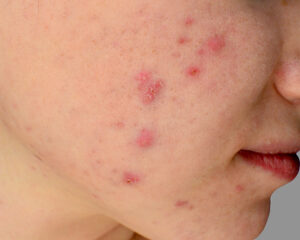
Understanding Acne: Causes, Symptoms, and Effective Treatments
Acne is a prevalent skin condition that affects people of all ages, most notably during adolescence, but it can persist into adulthood. Though often considered a temporary issue, acne can have lasting effects on both skin health and self-esteem. At Skin Revision, we offer comprehensive acne treatments tailored to address the root causes of breakouts and help restore healthy, clear skin. In this article, we will explore the causes, symptoms, and the most effective treatments available for acne, while highlighting the importance of consistent homecare alongside clinic treatments.
Types of Acne
- Whiteheads (Closed Comedones): These form when a hair follicle is blocked by oil and dead skin cells but remains closed from the air, giving the pore a white or flesh-coloured appearance.
- Blackheads (Open Comedones): Blackheads occur when the clogged pore stays open to the air, causing the trapped material to oxidise and turn black.
- Papules: Small, red, inflamed bumps that form when the walls surrounding the pores break down due to infection.
- Pustules: Inflamed bumps filled with pus, commonly known as pimples, caused by bacterial infection in clogged pores.
- Cysts: Large, painful lumps deep under the skin, known as cystic acne, which can cause scarring if not properly treated.
- Nodules: Solid, painful lumps beneath the skin’s surface. They do not contain pus but are deep and inflamed.
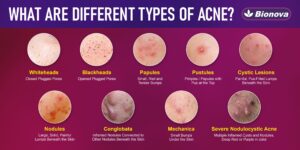
Common Causes of Acne
Several factors contribute to the development of acne, and understanding these causes is essential for effective treatment:
- Hormonal Changes: Hormonal fluctuations, especially during puberty, pregnancy, menstruation, or due to certain medications, can lead to increased oil production and cause acne.
- Excess Sebum Production: Excessive oil production by sebaceous glands can clog hair follicles, particularly for those with oily skin, making acne more likely.
- Bacterial Infections: Blocked pores can trap bacteria like Propionibacterium acnes, leading to inflammation, infection, and the formation of pimples or cysts.
- Genetics: A family history of acne increases the likelihood of developing the condition.
- Diet: Though the link between diet and acne is still debated, certain foods—such as those high in sugar or dairy—are thought to exacerbate breakouts.
- Stress: While stress doesn’t directly cause acne, it can worsen existing conditions by triggering the release of hormones that increase oil production and inflammation.
Symptoms of Acne
Acne symptoms vary depending on the type and severity, but common signs include:
- Red, inflamed bumps: Papules, pustules, and cysts can cause noticeable redness and swelling.
- White or black spots: Whiteheads and blackheads are the most common non-inflammatory forms of acne.
- Pain or tenderness: Cystic and nodular acne can cause significant discomfort due to deep infection.
- Scarring: Severe acne can leave permanent scars if untreated.
In addition to physical symptoms, acne can affect emotional well-being, particularly in teenagers and young adults, impacting self-confidence and increasing stress or anxiety over appearance.
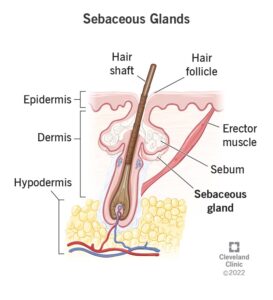
Treatment Options for Acne
At Skin Revision, we recognize that each person’s acne is unique. We provide personalised treatment plans designed to reduce active breakouts, prevent future flare-ups, and address acne scarring. Here are some of the most effective treatments for acne available:
- DMK Enzyme Therapy. DMK Enzyme Therapy works with your body’s natural processes to improve skin function. It detoxifies the skin, increases circulation, and oxygenates the tissue, helping to clear clogged pores, reduce inflammation, and regulate oil production.
Benefits:- Improves skin texture and reduces inflammation.
- Stimulates collagen production for healing.
- Safe for all skin types.
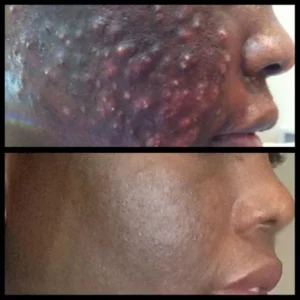
- Dermalux Tri-Wave LED Light Therapy This non-invasive therapy uses light energy to target acne-causing bacteria, reduce inflammation, and promote healing. LED light therapy is a gentle yet effective treatment that can be used alongside other acne treatments.
Benefits:- Reduces bacteria and inflammation.
- Promotes healing and skin rejuvenation.
- Safe with no downtime.
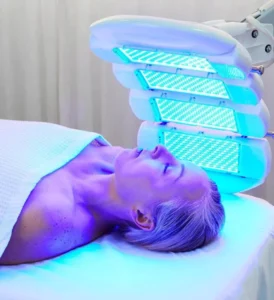
- Chemical Peels Chemical peels help reduce acne by exfoliating dead skin cells, controlling excess oil, and unclogging pores. Acids like salicylic or glycolic acid remove the top layer of skin, revealing healthier skin underneath.
Benefits:- Exfoliates dead skin.
- Reduces bacterial growth and inflammation.
- Enhances skin texture and clarity.
- Microneedling (for Acne Scarring) While not specifically for active acne, microneedling is highly effective in treating acne scars. It creates tiny injuries in the skin, stimulating collagen and elastin production to remodel scarred tissue.
Benefits:- Reduces the appearance of acne scars.
- Improves skin texture.
- Quick recovery and minimally invasive.
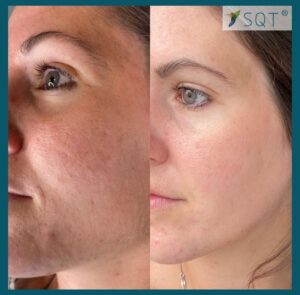
- Topical and Oral Medications In some cases, prescription medications such as topical retinoids, antibiotics, or oral treatments like isotretinoin may be recommended by a GP. These medications help reduce oil production, fight bacteria, and promote quicker skin cell turnover. Doctors may recommend these along with dermatologists, but we would stress that although on some people they may be effective, at Skin Revision, we feel that over the long term, more than 6 months, the body may reject the medicines. We believe there are side-effects if these drugs are taken over this period of time. We also feel that the acne is likely to come back after any course of medication / drugs have stopped being used. Always consult a dermatologist before beginning any medication.
Benefits:- Targets root causes of acne.
- Effective for severe and cystic acne.
- Can be combined with in-clinic treatments for enhanced results.
Important Considerations
We do not guarantee that any treatment will be 100% effective for every individual, as results can vary. It’s also important to understand that acne may initially worsen after treatment as impurities and bacteria are drawn to the surface. This is a normal part of the healing process, and continual treatments will work on both the inside and outside of the skin over time.
Additionally, prescribed homecare is crucial for success. Daily use of appropriate products will support the in-clinic treatments and help maintain clear skin throughout the prescribed course.
Preventing Acne Breakouts
To maintain clear skin and prevent future breakouts, consider the following tips:
- Wash your face twice a day with a gentle cleanser.
- Use non-comedogenic skincare and makeup products.
- Avoid touching your face to prevent the transfer of bacteria.
- Consider limiting foods that may trigger acne, such as dairy or high-sugar items.
- Manage stress through activities like exercise or meditation.
Acne is a common but manageable condition. At Skin Revision, our advanced treatments—such as DMK Enzyme Therapy, LED Light Therapy, and chemical peels—are designed to address your skin’s unique needs. However, consistent homecare and a tailored approach are key to long-term success. If you’re ready to begin your journey toward healthier, clearer skin, visit a skincare clinic near you today.
